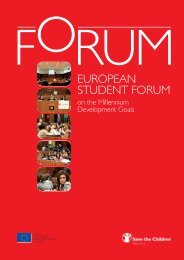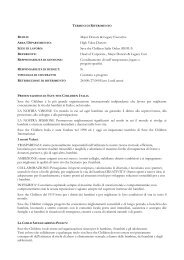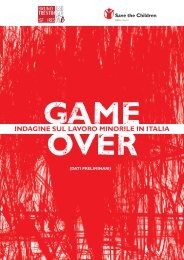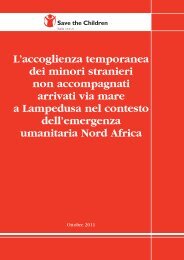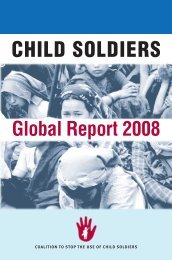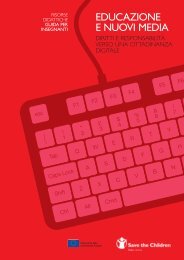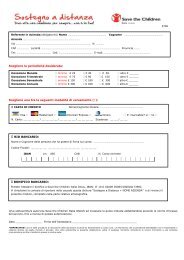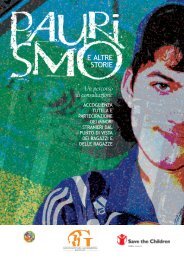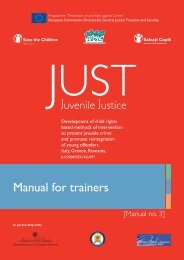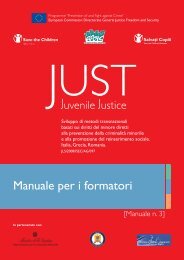FINAL REPORT - Save the Children Italia Onlus
FINAL REPORT - Save the Children Italia Onlus
FINAL REPORT - Save the Children Italia Onlus
Create successful ePaper yourself
Turn your PDF publications into a flip-book with our unique Google optimized e-Paper software.
IIIPART<strong>FINAL</strong> <strong>REPORT</strong>Development of a Child Rights Methodology to Identify and Support Child Victims of TraffickingMETHODOLOGICALFRAMEWORK No. 4AGIS METHODOLOGY - SECTION 2COORDINATION, COOPERATION AND APPROACHList of RelevantPrinciples of <strong>the</strong> UNConvention on <strong>the</strong>Rights of <strong>the</strong> ChildGiven that <strong>the</strong> AGIS methodology has been developed using <strong>the</strong>child rights based approach, <strong>the</strong> list of relevant principles of <strong>the</strong>UN Convention on <strong>the</strong> Rights of <strong>the</strong> Child that follows has beenincluded as part of <strong>the</strong> AGIS methodology. Those principles shallguide any action on identification and support of child victims.<strong>FINAL</strong> <strong>REPORT</strong>Development of a Child Rights Methodology to Identify and Support Child Victims of TraffickingVI. Right to family unityGrowing up with a family is a child’s fundamental right. Unaccompanied children have<strong>the</strong> right to be reunified with <strong>the</strong>ir family in <strong>the</strong> country where <strong>the</strong>y are living or in <strong>the</strong>ircountry or origin, where this is found to be in <strong>the</strong>ir best interests. Even if <strong>the</strong>y are notreunified with <strong>the</strong>ir family, <strong>the</strong>y should be allowed to keep in regular contact with <strong>the</strong>irfamily members (CRC Art. 7, 8, 9, 10, 18, 22).VII. Respect for cultural identity and cultural linguistic mediationA child’s right to enjoy his or her own culture, to profess and practise his or her ownreligion, or to use his or her own language is an important consideration to be respected(CRC art.8, 20, 29, 30).VIII. InformationIIIPARTI. Best interests of <strong>the</strong> childThe best interest of <strong>the</strong> child should be <strong>the</strong> primary consideration in all actionsconcerning children (CRC, art. 3). All o<strong>the</strong>r considerations, including border control andimmigration laws, are secondary.Any child shall have <strong>the</strong> right to seek, receive, impart information and ideas of all kinds,regardless of frontiers, ei<strong>the</strong>r orally, in writing or in print, in <strong>the</strong> form of art, or throughany o<strong>the</strong>r media of <strong>the</strong> child’s choice. He/she shall also have access to information andmaterial from a diversity of national and international sources. (CRC art.13 and 17).II. Non-discriminationAccording to this principle, <strong>the</strong> rights of any child should be respected, protected andfulfilled without discrimination of any kind, irrespective of <strong>the</strong> child’s or his or her parent’sor guardian race, colour, sex, language, religion, political or o<strong>the</strong>r opinion, national, ethnicor social origin, property, legal guardians or family members (CRC, art. 2).Foreign children should be guaranteed <strong>the</strong> same rights as children who are citizens. Theyshould be treated above all as children, and <strong>the</strong>ir immigration status should be asecondary consideration.III. Right to protectionForeign children have <strong>the</strong> right to be protected from: violence, abuse, neglect,exploitation for sexual, labour or any o<strong>the</strong>r purposes, trafficking, involvement in armedconflict, torture and deprivation of <strong>the</strong>ir liberty (CRC art.19, 22, 32-38).These children, whe<strong>the</strong>r temporarily or definitively deprived of <strong>the</strong>ir family environment,have <strong>the</strong> right to protection and assistance from <strong>the</strong> State (CRC art.22).IV. Right to life, survival and developmentEach child should be allowed and supported to develop to his/her full potential. Thisprinciple <strong>the</strong>refore acknowledges that vulnerable children, such as victims or potentialvictims of trafficking, should be ensured special protection and support and must begiven <strong>the</strong> opportunity to be active in <strong>the</strong>ir development (this being an holistic concept,including physical, cognitive, emotional, social, cultural and spiritual development)through <strong>the</strong> use of multi-disciplinary and inter-agency approaches (CRC art.6, 24, 27,28, 31).V. Right to participationAny child, who is capable of forming his/her own views has <strong>the</strong> right to express thoseviews freely in all matters affecting <strong>the</strong> child, his/her opinion being given due weight inaccordance with his/her age and maturity. This is relevant both in informal and formalsettings, such as judicial proceedings. Where possible trafficked children should <strong>the</strong>reforebe involved in decisions affecting <strong>the</strong>m and <strong>the</strong>y should be supplied with adequate andage-appropriate information, for example, in relation to procedures of identification andsupport (CRC art.12, 17).6263



